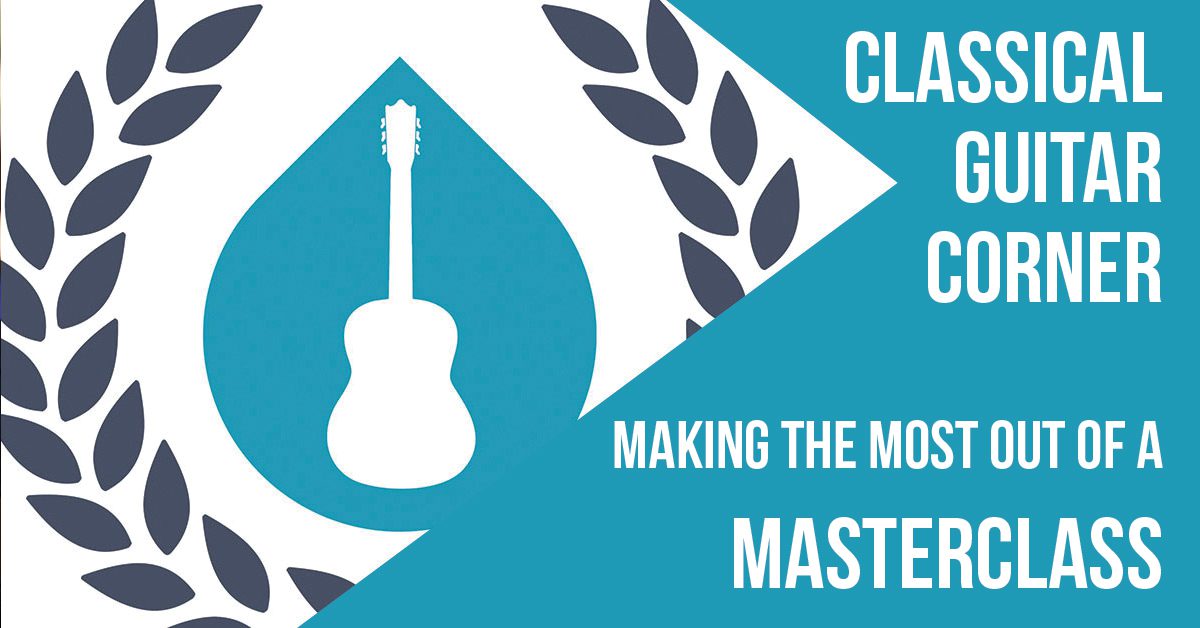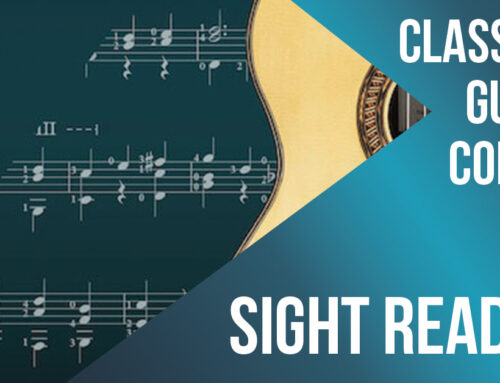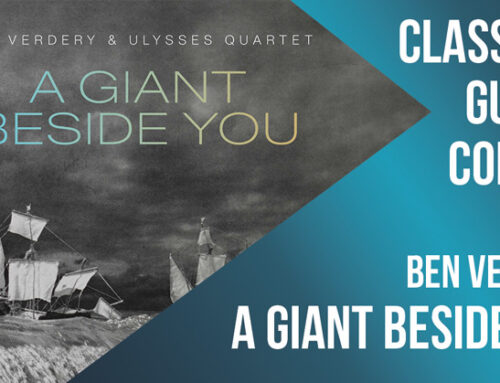Podcast: Play in new window | Download
Subscribe: Apple Podcasts | RSS
Making the Most out of a Masterclass
In episode 082 of the CGC Podcast, Simon discusses making the most out of a masterclass.
The term masterclass has come to signify a fairly wide range of teaching scenarios. It isn’t always dependent on a “master” teacher being present. Rather, it’s a lesson given to a student (or students) by a teacher (or teachers) in front of an audience. In addition, students are more often than not at an intermediate to advanced stage with their own playing skills.
A masterclass can be enjoyable and educational for both student and audience. Additionally, it can be quite thrilling to work closely with a performer you admire. Although the time is brief, the suggestions made can have a lasting impact.
Personally, I feel that masterclasses are best used for learning rather than focusing on the performative aspect. Regarding how best to learn in a masterclass, here are some suggestions to make the most of a good opportunity.
Flexibility is Key
An inflexible student in a masterclass can make for a frustrating time for all involved. Inflexibility in this scenario can come about from several factors.
Memorization
Memorization is often seen as an ultimate goal when learning a piece of music. However, the process of memorization has some serious pitfalls. The repetitious nature of memorization is intended to have you execute a set of movements in a reliably consistent way. Thus, when you are offered a suggestion to play something differently your ardent memorization prevents you from being flexible.
Often times the memorization of a piece will also mean that the student has stopped looking at the score. This can cause problems on its own such as incorrect notes creeping in unbeknownst to the player. In a masterclass setting, being unfamiliar with the score makes it rather difficult to use when talking about various passages. Even just locating where certain moments occur on the score can take time and slow the lesson down. This stalling is also linked to reading ability.
Sight Reading
Sight reading skills aren’t exactly attainable at short notice so it doesn’t fit to talk about them here. However, you could see just how beneficial the ability to read fluently would enhance a lesson in this context.
Perhaps more integral to the process than just reading the score is how well you know the piece of music.
As you move through the piece and suggestions are offered by the teacher you will inevitably be asked to play certain sections in isolation. Not all of these sections will be at the very beginning!
The ability to start playing from a random location in the score is not just reliant on sight reading. It also reflects how you have practiced the piece. If you have worked on smaller chunks of music during the learning process you will have created multiple points of familiarity. Places that, just like the beginning measures, you have played often enough that you can start from without hesitation.
If the student can’t start at the place being discussed they will often ask to back up to where they are more familiar so they can have a ‘running start’. This is fine but it does slow down the lesson considerably.
Preparation (Choosing a piece)
Choosing an appropriate piece of repertoire will change your experience dramatically.
Given the performative element of the masterclass it can be enticing to play a virtuosic piece. One that shows off what you can do. Sometimes these virtuosic pieces can be an overreach of our abilities. That means that there is little to talk about in the lesson. If the student can’t play the piece, or play it at tempo it can be challenging to engage the musical aspects.
A half baked piece also has problems in a masterclass setting. Yes, it can be very useful to have a lesson with your teacher while you are still learning the nuts and bolts of a piece. But bringing a piece to a masterclass without sufficient preparation will result in a missed opportunity. In this situation the teacher might end up hand-holding the student as they chop through the score. And they really won’t get to offer up much of their expertise, which is probably why they are there.
I would suggest that the best option in terms of repertoire is a piece that is below your level of ability and that you have prepared very well. With the piece being well within control of your abilities you will be more flexible and adaptive. Furthermore, having the nuts and bolts taken care of will open the field for more impactful observations from the teacher.
Mindset
A masterclass will mean different things to each of us, however, I think we all benefit most when we view the experience through a lens of learning. If viewed as a performance, an occasion to be judged, or a situation where we need to defend our decisions we might miss out on some valuable insights.
With so many wonderful resources available to us today it can be quite easy to negate the teacher or find contrary examples of what is being offered. While engaging in debate about a suggestion might make for an interesting conversation I don’t think it makes for the best learning. I would suggest going with the teacher and trying out ideas. You can decide what to do with them later. I am sometimes reminded of the approach actors take when improvising on stage. When an idea is presented their reaction is “yes, and…” they always go with whatever is suggested and can add on from there. If an idea is shot down with a no, or a contradiction, the flow of interaction is sabotaged.
Don’t be too hard on yourself. That counts for before, during, or after the masterclass. If we focus on the learning opportunity it will take away from some of the performance anxiety in these situations. The need to prove yourself is a distraction. Try to remain positive and resist chastising yourself during or after the class. I believe that the student should be lauded for simply preparing and going through the process in the first place, that is already a success in my book.
The Masterclass Effect
Sometimes there can be a rather magical effect that comes about in masterclasses where, after ten or fifteen minutes of suggestions and observations, the student begins to play noticeably better. While this may have something to do with what has been said it probably has more to do with the comfort and relaxation of the student.
It does, of course, make for entertaining viewing by the audience but like all lessons the bulk of improvement will happen in the subsequent practice sessions where ideas are implemented and worked on with perseverance.
Stay and learn!
One of the biggest surprises to me is when students will leave after they have had their lesson. So many ideas that were offered to you will likely be expanded upon and reinforced by listening to other students. This goes for before your lesson too. If I had to choose between missing someones lesson and warming up, I would skip the warming up. Sure, you may not play at your absolute best but once again, this is not a concert.
The teacher’s point of view
One last thought I will share with you is to consider the teacher’s experience. By considering the experience of the teacher it might better help you understand the ebb and flow of any given class.
The teacher in a masterclass is also performing and they are juggling several different elements. Tending to the student is often of primary concern, but there is also the audience to consider. On top of this, forming cogent ideas and suggestions while trying to make astute observations about someones playing without any prior experience with the person can add another layer of challenges. The individual chemistry between the teacher and student will affect the flow of the experience as will the level at which the student plays.
The Repertoire
The last layer of difficulty comes with the repertoire presented. Hopefully the teacher will have substantial teaching experience under their belt before appearing in a public masterclass but it is impossible for a teacher to be familiar will the entire repertoire and unfamiliar pieces are inevitable at some point.
In my own experience I am grateful to organizers who either communicate what pieces are to be played ahead of time or they actually allow the teacher to select what pieces they will be teaching. This allows for preparation and the chance to further familiarize oneself with the score and composer. This doesn’t always happen, however, and you just have to be ready to listen to whatever is played.
All of this gives further credence to watching an entire masterclass instead of just a segment. You will get a better understanding of the teacher’s aesthetic and approach and you will start to hear concepts arise multiple times.
Let it sink in
I can attest that as a younger student I would attend multiple masterclasses of the same teacher (sometimes up to ten or fifteen over the course of a few years) and after a while the teachings became a little repetitive and predictable. I see this as a wonderful thing because it meant that I really understood their observations and I began to make them myself as I heard the student play. What a wonderful learning experience that was!





This really helped me prepare for a recent master class. I was able to put myself in a good, calm mindset. The result was a very successful learning experince with a master teacher.
Thanks for all the great thoughts on this, Simon. I’ve been wanting to try a masterclass but felt intimidated by the name and thinking I would have to do a stellar performance of a really advanced piece! I really like the idea of getting into the right mind set.